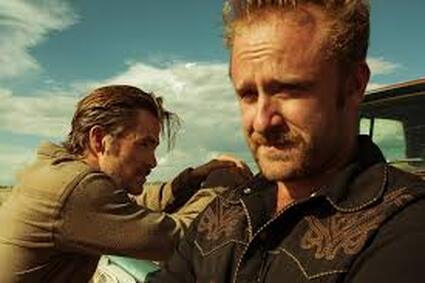B+ | Two Texas brothers and bank robbers evade the Texas Rangers. Directed by David Mackenzie Starring Chris Pine, Jeff Bridges, and Ben Foster Review by Jon Kissel (reposted from January 2017) |

The cop close to retirement is a trope easily spotted, as are the reckless thief and his stoic partner, but Sheridan's script packs a lot of detail and nuance into a familiar space. Hell or High Water is capturing a specific period in time, where a way of life is ending on the back of globalization and finance. The area where it all takes place is lousy with fossil fuels, but it's suffering from a resource curse, where the money comes out of the ground and immediately leaves. The banks that the Howards are stealing from are selling reverse mortgages that trap citizens in a dying town without much hope that things will turn around. The managers that sign those loans, perfectly cast as sweaty middlemen who cloak their greed under shallow obsequiousness, are resented by everyone as the financial gatekeepers who hold the door open with a smile and then put a soft-soled boot on their customers' necks after they walk through it. There's an unavoidable Robin Hood aspect to this film, despite the brothers' keeping the money for themselves. They steal from the rich and give the poor a delicious helping of schaudenfraude, which they are happy to take. The law, represented by the Rangers, are of these people, but that doesn't get them anywhere. Privation and hopelessness have cut whatever bonds they might once have had.
This environment is one well-suited to the dynamic between the Howards. Toby still allows himself the possibility that things will work out alright, if not for him, than for his sons. Tanner is more fatalistic, only interested in how happy a single moment can make him, the future be damned. An alternate version of this story has Tanner fall into oxycontin dependence, like so many thousands of others in rural communities. More of an adrenaline junkie, he puts Toby at risk, but then this is all his idea in the first place. Each brother knows the stakes and implicitly agrees on them, preventing any unnecessary conflict between them and focusing the drama on the accomplishment of their goals.
Pine and Foster have a lived in chemistry, nowhere more apparent than in a magic-hour tussle Mackenzie captures between the two that evokes the rosiest moments of Friday Night Lights. Pine is surprisingly strong in the role, and Foster is playing a character much like his elevated psychos in 3:10 to Yuma or Alpha Dog but modulated from those cartoonish heights. However, Bridges steals it from both of them, and from an increasingly-exasperated Birmingham, with a resigned, lackadaisical performance that occasionally erupts into a shocking bout of emotion. He's reminiscent of Tom Hanks' performance in Captain Phillips, someone keeping it together until the system can't hold it in any longer. Mackenzie gives him a needed win after flops like RIPD and The Seventh Son, and the grizzled vet makes the most of it.
There's plenty of places like the central location of Hell or High Water, but not every one of those towns has scheming bank robbers that are relieving everyone's collective frustrations. There are other ways to do that, like in the voting booth. I watched this film before the election, and after, it gains another level. Civil society has been steadily fracturing for decades, and in the wake of shuttered factories and wealth inequality and rising costs and migration and a deluge of conflicting media sources, the dam may have finally burst. Mackenzie and Sheridan have made a story that illustrates what could be the next step, one of violence and wide distrust and revenge on institutions. The real life ending likely won't have as pat an ending as this well-crafted film. B+
 RSS Feed
RSS Feed